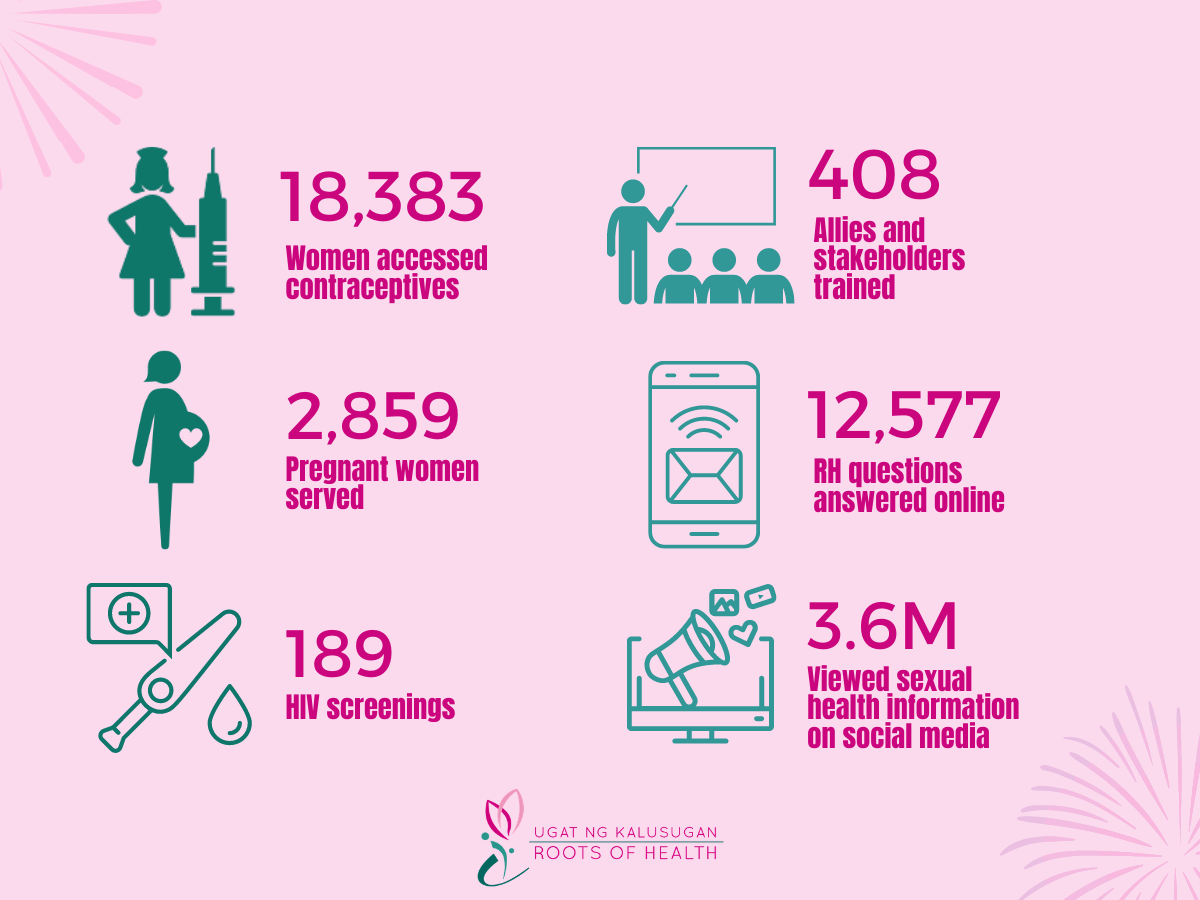COVID-19 created so many challenges to the work we do. But because the pandemic put more women and young people’s lives at risk, we knew we needed to make sure we could keep providing life-saving essential services, education, and stakeholder trainings.
Thanks to our supporters, we managed to continue providing all this in 2020, and more. Here’s a quick recap of what we couldn’t have done without our passionate supporters who donated and advocated for reproductive health rights.
SERVICES
We knew that COVID-19 lockdowns would contribute to mistimed and unwanted pregnancies. That’s why we worked hard to provide contraceptives to women and girls all over Palawan.
Unfortunately, we had to shut down our clinics for 3 weeks. We had to pause providing prenatal screenings to reduce health risks for our clinical staff.
But many women and young people were still able to access birth control, despite restrictions on their movements. Our clinical staff traveled to remote areas for women and girls who could not make it to our clinics. As soon as we were allowed to reopen our clinics, we installed safety measures and put an appointment system in place, in order to minimize COVID-19 risks to our clients and clinical staff. During the latter part of the year, pregnant women were again able to access prenatal care, as we resumed providing this service in our main clinic.
Last year, we started providing HIV screening in our clinics. Unfortunately, due to COVID disruptions, we had to rely more on our community-based screeners this year, especially for young people unable to travel to our clinics.

Roots of Health nurse Piety administers a birth control shot to a client. With this contraceptive, women won’t have to worry about unplanned pregnancies for up to three months.
In 2020, we were able to:
- Provide 18,383 women and girls with their contraceptive of choice, ensuring that they do not have an unplanned pregnancy;
- Support over 75 pregnant women and girls; and
- Provide 2,859 prenatal checkups and free prenatal vitamins:
- Screen 189 clients for HIV
EDUCATION AND TRAINING
Many young people still have a lot to learn about sexual health. Before COVID-19, we traveled to different schools all over Palawan, including far-flung islands and remote municipalities. We taught classes about puberty, pregnancy, sexually transmitted infections and other sexual health concerns.
As schools have been closed since March, we’ve been unable to conduct in-person education sessions for large groups. We’ve gone online with information sharing and consultations, so women and young people can still access information on pregnancy, contraceptives, HIV and other sexual health issues.
We converted existing materials into bite-sized social media posts that are easily readable and comprehensible for online audiences. Through different Facebook groups for various stakeholders, such as parents, young people, health workers, and teachers, we were able to deliver information on sexual and reproductive health to the people who needed them.
This year, we were able to:
- Reach a total of 3.6 million social media users with information on reproductive health;
- Deliver information to 1,713 people in Facebook groups;
- Answer 12,577 questions about reproductive health received on our clinic pages.
Make 2021 safer for young people.
SYSTEMS STRENGTHENING
We continued to support our government counterparts with the creation of local legislation that supports reproductive health services and education. Despite the mobility restrictions due to COVID-19, health centers did not have to worry about contraceptive stockouts, thanks to the logistical support we provided, especially when lockdowns began.
We contributed personal protective equipment for health care workers in Puerto Princesa. Frontliners and persons under quarantine for COVID-19 were also given free contraceptives and HIV screening.

Community Health Advocates practice with each other, as they learn how to take a client’s vital signs.
Large gatherings were not allowed, so we had to scale down our training sessions with different stakeholders and trained them in much smaller groups instead. This year, we trained a total of 408 reproductive health allies, including youth council members, community health workers, service providers, nurses and midwives. We focused the sessions on how to make their services more youth-friendly, and how to continue providing reproductive health services during the pandemic.
Make 2021 safer for Filipinos.
Despite all the uncertainties and crises we faced in 2020, your support made this all possible. Thank you for continuing to believe in us.
We are excited to continue our important, life-saving work to make the coming year safer for more Filipino women and young people, and we would appreciate your help. If you haven’t already, please consider donating to our #Safer2021 campaign. We’re excited to share that for the first time, we’re doing our year-end fundraiser on our own website. This means your entire donation will go to Roots of Health, without third-party fees.
We’d love your help in raising $10,000 before the year ends!
Donate until December 31, and your donation will qualify as tax deductible for the year 2020, either in the United States or the Philippines.
You may make an online donation here, or contact us if you’d like to make a donation through other channels.





